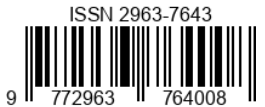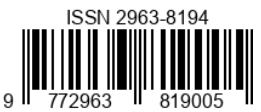PENGARUH LOCUS OF CONTROL DAN PERILAKU INOVATIF TERHADAP WORK ENGAGEMENT MELALUI SELF-EFFICACY
DOI:
https://doi.org/10.55606/jekombis.v1i4.638Keywords:
Locus of Control, Innovative Behavior, Self-efficacy, and Work Engagement.Abstract
This study aims to examine and examine the effect of Locus of Control and Innovative Behavior on Work Engagement through Self-efficacy Mediation. Locus of Control and Innovative Behavior as exogenous variables, Self-efficacy as mediating variables and Work Engagement as endogenous variables. This research was conducted on employees of PT Garuda Maintenance Facility Aero Asia Cengkareng Engineering Services section with the Non Probabilty Sampling method totaling 150 respondents. The analytical method used is Structural Equation Model-Partial Least Square (SEM-PLS). The results of this study prove that Locus of Control has an effect on Work Engagement, Innovative Behavior has an effect on Work Engagement, Self-efficacy has an effect on Work Engagement, Locus of Control has an effect on Self-efficacy, Innovative Behavior has an effect on Self-efficacy, Locus of Control has an effect on Work Engagement through Self-efficacy and Innovative Behavior has an effect on Work Engagement through Self-efficacy.
Downloads
References
Abdurrahman, M. S., Purnomo, R., & Jati, E. P. (2019). Pengaruh Motivasi Kerja Otonom dan Internal Locus of Control Terhadap Kinerja Karyawan dengan Employee Engagement Sebagai Variabel Mediasi. Performance, 26(2), 66–76. https://doi.org/10.20884/1.jp.2019.26.2.1621
Alfarizi, M. K. (2019). Kenapa Kepribadian Manusia Berbeda dan Bisa Berubah? Ini Jawabnya - Tekno Tempo.co. Tekno.Tekmpo.Com. https://tekno.tempo.co/read/1284740/kenapa-kepribadian-manusia-berbeda-dan-bisa-berubah-ini-jawabnya/full&view=ok
Amalini, H. F., Musadieq, M. Al, & Afrianty, T. W. (2016). Pengaruh Locus of Control Terhadap Kepuasan Kerja dan Kinerja (Studi pada Karyawan Perusahaan Daerah Air Minum (PDAM) Kota Malang). Jurnal Administrasi Bisnis S1 Universitas Brawijaya, 35(1), 68–77.
Ardi, V. T. P., Astuti, E. S., & Sulistyo, M. C. W. (2017). Pengaruh Self-efficacy Terhadap Employee Engagement dan Kinerja Karyawan ( Studi pada Karyawan PT Telekomunikasi Indonesia Regional V Surabaya ). Jurnal Administrasi Bisnis (JAB), 52(1). https://media.neliti.com/media/publications/202050-pengaruh-self-efficacy-terhadap-employee.pdf
Ashagi, M. M., & Beheshtifar, M. (2015). The Relationship between Locus of Control ( Internal - External ) and Self-Efficacy Beliefs of Yazd University of Medical Sciences. International Journal of Engineering and Applied Sciences, 2(September). https://www.researchgate.net/publication/282182805_The_Relationship_between_Locus_of_Control_Internal_-_External_and_Self-Efficacy_Beliefs_of_Yazd_University_of_Medical_Sciences
Auna, M. S. S. (2020). Locus of Control and Self-Efficacy on Entrepreneurial Intentions in the Digital Age. Advances in Social Science, Education and Humanities Research, 395(Acpch 2019), 289–292. https://doi.org/10.2991/assehr.k.200120.061
Bhatnagar, J. (2012). Management of innovation: role of psychological empowerment, work engagement and turnover intention in the Indian context. International Journal of Human Resource Management, 23(5), 928–951. https://doi.org/10.1080/09585192.2012.651313
Birdi, K., Leach, D., & Magadley, W. (2016). The Relationship of Individual Capabilities and Environmental Support with Different Facets of Designers’ Innovative Behavior. Journal of Product Innovation Management, 33(1), 19–35. https://doi.org/10.1111/jpim.12250
Brad Shuck, M., Rocco, T. S., & Albornoz, C. A. (2011). Exploring employee engagement from the employee perspective: Implications for HRD. Journal of European Industrial Training, 35(4), 300–325. https://doi.org/10.1108/03090591111128306
Gallup. (2013). State of the Global Wor kplace.
Getz, I., & Robinson, A. G. (2012). Innovate or die: Is that a fact? Creativity and Innovation Management, 12(3), 130–136. https://doi.org/10.1111/1467-8691.00276
Ghozali, I., & Latan, H. (2015). Partial Least Squares Konsep, Teknik dan Aplikasi Menggunakan Program SmartPLS 3.0 untuk Penelitian Empiris. Badan Penerbit UNDIP.
Hadi, S., Putra, A. R., & Rahayu Mardikaningsih. (2020). Pengaruh Perilaku Inovatif dan Keterlibatan Kerja terhadap Kinerja Karyawan. Jurnal Baruna Horizon, 3(1), 156–169.
Hair, J., Sarstedt, M., & Ringle, C. (2017). Partial Least Squares Structural Equation Modeling. https://doi.org/10.1007/978-3-319-05542-8_15-1
Helmy, I., & Pratam, M. P. (2018). Pengaruh Proactive Personality dan Pemberdayaan Psikologis Terhadap Perilaku Inovatif Melalui Creative Self-efficacy. Jurnal Pro Bisnis, 11(2), 14–21. https://ejournal.amikompurwokerto.ac.id/index.php/probisnis/article/view/697
Huhtala, H., & Parzefall, M. R. (2018). A review of employee well-being and innovativeness: An opportunity for a mutual benefit. Creativity and Innovation Management, 16(3), 299–306. https://doi.org/10.1111/j.1467-8691.2007.00442.x
Jong, J. De, & Hartog, D. Den. (2019). Innovative Work Behaviour: Measurement and Validation. December 2008. https://doi.org/10.1111/j.1467-8691.2010.00547.x
Khoiruman, M., & Purba, S. D. A. (2020). Pengaruh Green Product, Green Price, dan Green Advertising Terhadap Keputusan Pembelian Produk Essential Oil di Rumah Atsiri Indonesia. 7(1), 46–54.
Kim, N. R., & Lee, K. H. (2018). The Effect of Internal Locus of Control on Career Adaptability: The Mediating Role of Career Decision-Making Self-Efficacy and Occupational Engagement. Journal of Employment Counseling, 55(1), 2–15. https://doi.org/10.1002/joec.12069
Kusuma, A., Purwanto, H., & Utama, P. (2021). Pengaruh inovasi terhadap kinerja karyawan dengan self efficacy sebagai moderasi The effect of inovation toward working performance with self efficacy as mediator. 23(2), 302–309. http://journal.feb.unmul.ac.id/index.php/FORUMEKONOMI%0APengaruh
Laat, F. de. (2016). The effect of work locus of control on the relationship between inclusive leadership and work engagement .
Lewinci, P. G., & H.Mustamu, R. (2016). Pengaruh Employee Engagement Terhadap Kinerja Karyawan Pada Perusahaan Keluarga Produsen Senapan Angin. AGORA, 4(2), 1–7.
Myers, J. A. (2014). Employee locus of control and engagement in nonprofit organizations. Dissertation Abstracts International Section A: Humanities and Social Sciences, 76(3-A(E)). http://search.ebscohost.com/login.aspx?direct=true&db=psyh&AN=2015-99170-082&lang=de&site=ehost-live
Ningrum, C. Y. (2020). Pengaruh Perilaku Inovatif Terhadap Kesuksesan Karir Melalui Self-Efficacy Karyawan PT Bank Pembangunan Daerah Jawa Timur Tbk Kantor Pusat Surabaya. Equilibrium: Jurnal Ekonomi-Manajemen-Akuntansi, 16(1), 1. https://doi.org/10.30742/equilibrium.v16i1.635
Ningrum, W. R., & Abdullah, S. M. (2021). Tinjauan Literatur: Perilaku Inovatif Pada Guru. Prosiding Seminar Nasional Fakultas Psikologi UMBY, 201–214.
Noviasari, D., MM, A. T. H. S., & MM, A. S. M. (2018). Analisis Pengaruh Kualitas Pembelajaran Kewirausahaan, Kreativitas Inovasi, dan Modal Sosial Terhadap Minat Wirausaha Dengan Efikasi Diri sebagai Variabel Intervening (Studi Pada Siswa SMK N 3 Semarang). Journal of Management, 4. http://jurnal.unpand.ac.id/index.php/MS/article/view/999
Paramanandam, P., & Sangeetha, K. (2015). Locus of Control and Employee Engagement Among the Employees of Automobile Industry. GBAMS- Vidushi, 6(01–02), 77–85. https://doi.org/10.26829/vidushi.v6i01-02.9725
Rofiana, L., & Rizal, A. (2015). Analisis Pengaruh Locus of Control dan Lingkungan Kerja Terhadap Kinerja Pegawai dengan Self Efficacy sebgaia Mediasi. Jurnal Telaah Manajemen, 11(1), 145–157.
Rohida, L. (2018). Pengaruh Era Revolusi Industri 4.0 terhadap Kompetensi Sumber Daya Manusia. Jurnal Manajemen Dan Bisnis Indonesia, 6(1), 114–136. https://doi.org/10.31843/jmbi.v6i1.187
Tims, M., & Akkermans, J. (2017). Core self-evaluations and work engagement: Testing a perception, action, and development path. PLoS ONE, 12(8), 1–20. https://doi.org/10.1371/journal.pone.0182745
Tyas, A. A. W. P., Nurhasanah, N., Sugiharto, A., & Santoso, A. B. (2021). the Influence of the Work Environment on Work Attachment Through Self Efficacy in the Balitbang of the Indonesian Ministry of Law and Human Rights. International Journal of Psychosocial Rehabilitation, 24(1), 1136–1144. https://doi.org/10.48047/rigeo.11.06.130
Venkoba, R. (2016). Innovation Through Employee Engagement. Asia Pacific Journal of Advanced Business and Social Studies, 2(2), 337–345. www.apiar.org.au
Widianti, D. (2016). Pengaruh Dimensi Strategi Inovasi Dan Pengungkapan Sustainability Report Terhadap Nilai Suatu Perusahaan Dengan Menggunakan Metode Tobin’s Q. 26–69. Repository, 26–69.
Winadi Prasetyoning Tyas, A. A., Tippe, S., & Sutanto, S. (2020). How Employee Competency and Self Efficacy Affect Employee Work Engagement in Human Resource Development Agency (BPSDM) Ministry of Law and Human Rights Republic of Indonesia. IJHCM (International Journal of Human Capital Management), 4(2), 125–140. https://doi.org/10.21009/ijhcm.04.02.11
Downloads
Published
How to Cite
Issue
Section
License
Copyright (c) 2022 Jurnal Penelitian Ekonomi Manajemen dan Bisnis

This work is licensed under a Creative Commons Attribution-ShareAlike 4.0 International License.







